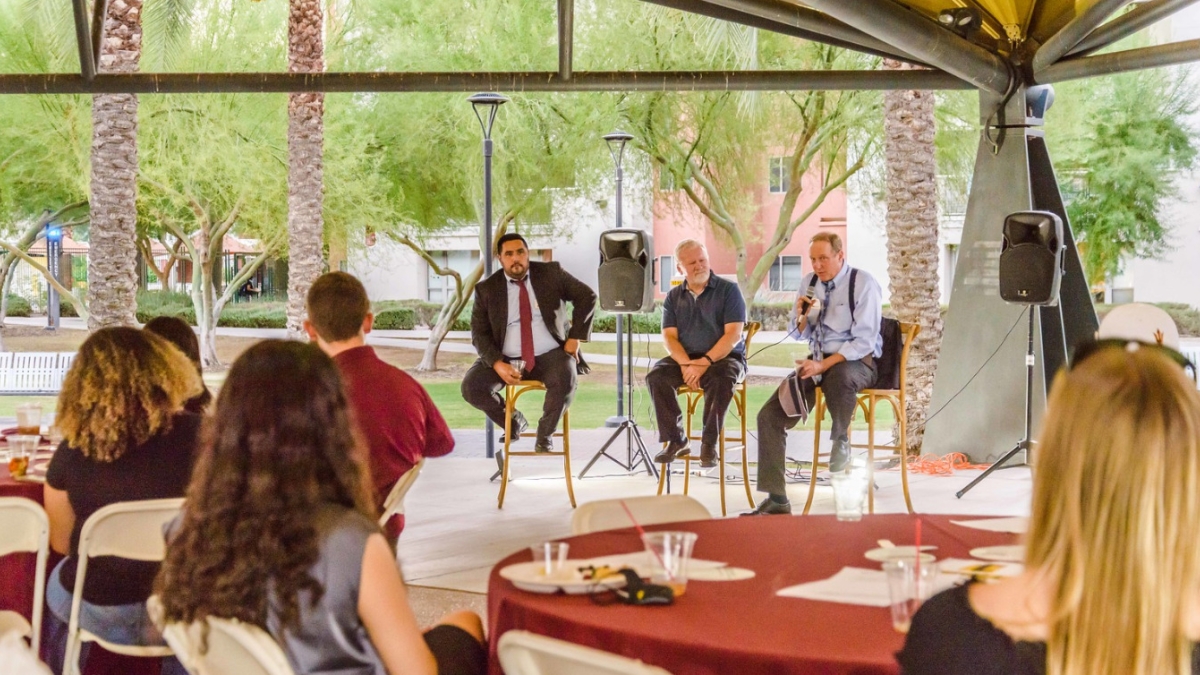What is it like to be a lawyer?

Barrett, The Honors College, alumni Ray Ybarra Maldonado (background, left) and Robert McWhirter (right) talk about the practice of law with Honors Faculty Fellow Michael Stanford (center) at the college's Inn of Court event.
The practice of law is a vocation that requires varied interests and skill sets, a client-centered focus and adaptability.
That was among the messages shared with 50 pre-law Barrett, The Honors College, students at the college’s Inn of Court networking event on Sept. 21.
The event, focusing on the legal profession and held under the historic Gold Dome in the Vista del Sol complex on ASU's Tempe campus, drew 26 honors college alumni practicing in many areas, including corporate, criminal defense, immigration, personal injury and constitutional law, as well as the 50 pre-law students.
A wide-ranging panel discussion moderated by Honors Faculty Fellow Michael Stanford — who holds a Juris Doctor and practiced law before joining the Barrett faculty — featured Barrett grads Ray Ybarra Maldonado, who received a JD from Stanford University Law School in 2007, and Robert McWhirter, who received his law degree from ASU’s Sandra Day O’Connor College of Law in 1988.
Ybarra Maldonado and McWhirter encouraged students to acquire varied experiences as undergraduates that would help them stand out as well-rounded candidates on law school applications.
“What’s most helpful for law school candidates is diversity and a variety of experiences. Everyone is going to have a high GPA and LSAT score. What makes you different? What are you passionate about?” Ybarra Maldonado said, adding that experiences such as study abroad and community service make applicants stand out on law school applications.
McWhirter said he mentioned his work as a teacher at a Catholic school in Peru on his law school application.
“I think that may have made me more different and interesting,” he said.
Ybarra Maldonado and McWhirter said there’s no typical day in the life of a lawyer. On any given day they may meet with clients, review cases, promote their practices or give a media interview.
But both agreed that one aspect of being a lawyer — client service — is paramount.
“I have found that the attorneys who are happiest are the ones who are client-centered. People who look at the service aspect generally have more longevity” in the legal profession, McWhirter said.
After the panel discussion and dinner, students participated in speed networking with attorneys sitting at tables.
“Since I am a marketing major, I was looking for specific advice on business law. The attorneys were very keen on giving me advice and explaining the difference between working for a private legal firm as opposed to in-house for a corporation,” said sophomore Sara Sroka.
Sroka, who works in the Barrett student services department helping to coordinate wellness-centered events for students, said she was interested in how attorneys pursue wellness and work-life balance.
“Many of the lawyers touched on the importance of wellness as a law student and in the profession itself," Sroka said. "As the wellness event planner for Barrett, I think the growing trend of incorporating wellness into professions is a positive reflection of the culture change in society as people want to maintain their mental health and pursue career success, however they might define success.
“I found it particularly interesting when the female attorneys talked about wellness in their careers. When they decided to raise a family, they had to decide how to balance their careers with their personal lives. Also, they spoke to whether or not they felt discriminated against as women returning from maternity leave. As a woman, I feel it is important to acknowledge the gender barriers that may be placed in my future career path, and how women in the legal field now are fighting for gender equality for future generations like myself.”
Connor Christeson, a first-year Barrett student majoring in finance, aspires to work as a contracts lawyer. His mother is an attorney specializing in estate planning, so he has had some close exposure to the profession.
“I gained great insight into ways I can start building my law school application, especially how I can make myself stand out,” he said.
Christeson said he’ll research opportunities that the honors college has to offer for students interested in the law, including Project Excellence, a program through which honors students can take courses at ASU’s law school, and help with applying for competitive national awards like the Fulbright Scholarship.
More Law, journalism and politics

Native Vote works to ensure the right to vote for Arizona's Native Americans
The Navajo Nation is in a remote area of northeastern Arizona, far away from the hustle of urban life. The 27,400-acre…

New report documents Latinos’ critical roles in AI
According to a new report that traces the important role Latinos are playing in the growth of artificial intelligence technology…

ASU's Carnegie-Knight News21 project examines the state of American democracy
In the latest project of Carnegie-Knight News21, a national reporting initiative and fellowship headquartered at Arizona State…